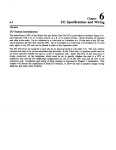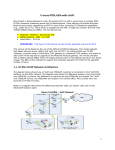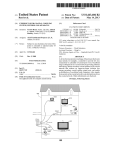Download Series One Programmable Controllers Series One/One Plus User`s
Transcript
6-39 I/O Specifications and Wiring GEK-90842 High Speed Counter IC610MDLllO The High Speed Counter module (HSC) allows a Series One or Series One Plus PC to monitor and control a number of process variables (position, velocity, flow rate) that the CPU cannot control due to timing constraints. A logical relationship between the counters seven inputs, the preset, and current value determines the status of its own two external outputs as well as others through CPU user logic. Figure 6.41 illustrates this concept. The module can be installed in any of the first 4 I/O slots adjacent to the CPU, and uses 8 I/O and 2 counter references to interface with user logic. Indicators on the front face of the module give output and count status. General Increment (Up) Count Decrement (Down) Count Reset/Marker PIeset value (0 - 9999) Current Value (0 - 9999) Two Discrae DC (5 - 24 V) Current Value (BCD) < 100 Microseconds Between Pulse Received and Transition of Output up/Down counter Inputs up/DOWn COMW specifications OUtpUtS Reaction Time Environmental Operating Temperature Humidity, Non-Condensing Power Consumption from Internal Supply Pulse Rate we Minimum Pulse Width OFF- 0 to 6o” c 5 to 95 % 70mA@9Vdc Without Filter < 10 Hz With Filter < 500 Hz (Filter selection by thee dip switbes on module, see page 6-69) 0 to 9999 Binq bled Dhnal(BCD) 25 mS I +25@=4 6-41 I/O Specifications and Wiring GEK-90842 Module Location The High Speed counter module (HSC) can be installed in any one of the four I/O slots adjacent to the CPU slot in the CPU chassis. In figure 6.42, these slots are shown (A, B, C and D) for a 5-slot rack. In a lo-slot rack, the HSC must also occupy 1 of the 4 slots adjacent to the CPU. Also shown in this figure are the I/O references used by the HSC to intetiace with user logic. Note how an HSC located in Slot A uses I/O references associated with both Slot A (O-3) and Slot A’ (100-103). Since each slot in a Series One or Series One Plus PC I/O system corresponds to a special group of eight I/O references, an HSC in Slot A eliminates Slot A’ from the I/O system. Likewise an HSC located in Slot B eliminates Slot B’ from the I/O system. In summary, an HSC physically occupies one YO slot, but requires two slots worth of I/o references to interface with user logic (Refer to table 6.5). pc-sl -84-QOO 1 /ll-knIIlII I I 67 1 57 ! i ONE SERIES 47 F&we 6-42. HSC Location in 5-Slot Rack 6-42 I/O Specifications and Wiring Table 6-5. Number of HSCs vs Discrete I/O Capacity NUMBER OF HIGH SPEED COUNTER MODULES IN SYSTEM REMAINING DISCRETE I/O CAPACITY / seriesone I Seri~OnePlUS 112 96 168 152 136 120 104 80 64 48 Interface to Field Devices A 32 PIN Connector (Refer to figure 6.43) on the faceplate of the HSC is the interface between the module and its associated field devices which include: 1. Counting mechanism encoder). which controls the Up/Down counter (typically a bidirectional 2 . Four digit binary coded decimal (BCD) display of counters current value. 3 . Two 5 to -24 V dc loads under control of tvvo counter outputs. Zoo0 @CD)- c 1000 400 100 i-1 RESn MARKER BCD) BCD) @CD, 40 (BCDI 10 fBCD1 4 @CD) 1 MD) (+I (-1 SVDC 2 5- OR 12VDCZlD% RESFf (+I MARKER 5 VDC = 5- OR 12VDCzlo; 1 (-1 DECREMENT f-1 INCREMENT COWTER COWTER i+b DECREMENT (+I INCREMENT COUNTER COUPTER Figure 6143. HSC Connector Pin Definition In the interestof claritythe specifications for each field device are addressed separately. incremental 6-43 I/O Specifications and Wiring GEIL90842 Up/Down Counter Inputs SPECIF’ICATIONS RESET INPUT UP/DOWN INPUT WEM Minimum Input Pulse ‘width Supply Voltage OnCuIrent off Current On Voltage Off Voltage 25 nsec loo nsec +12 V dc, 10% <3mA 10 to 15 IILA <3Vdc >7Vdc +12 V dc, 10% 10 to 15 mA <3mA UVdc <3Vdc OFF r a40068 I I . . ON--T ON ,T OFF 4 RESET* COUNT* Figure 644. Signal Direction The conditions necessary to increment/decrement, particular interest when counting in one direction or reset the counter are described below. only. DESIRED ACTION Incxement Current Count Decrement Cunent Count Reset Chent Count Increment Input: Decrement Input: Reset Input: CONDITION Increment Input: (Disabled) - (Enabled) Deuement Input: Disabled Reset Input: Disabled Decrement Inputz (Disabled) - (Knabled) Increment Input: Disabled Reset Input: Disabled Reset Input (Disabled) -- (Enabled) Increment Input: Disabled or Enabled Decrement Input: Disabled or Enabled Disabled,~10VdcBetweenPhsB1andAl Enabled,<2VdcBetw~nPinsBl andA1 Disabled,>lOVdcBetweenF5niB2andA2 Enabkd,<2VdcBetweenPinsB2andA2 Disabled,<2VdcBetweenPinsB6andA6 Enabled,~lOVdcBetweeaPinsB6andA6 Figure 6-45. UPlDOWNkESET Input Circuit . This is of 644 I/O Specifications and Wiring GEK-90842 Encoder Interface 1 Typically an incremental encoder controls the counter through the Up/Down, and Reset Inputs. To comply with HSC circuitry, the encoder should represent clockwise and counterclockwise movement of its shaft with two separate pulse trains that increment and decrement the counter. Figures 6.46, 6.47, and 6.48 illustrate sample connections. .’ pc-~1-84-0005 WGMSPEEDCou)JrrcI MWULE Figure 6-46. Encoder with RESET/MARKER Option Resetting Counter Once Der Revolution _ of Encoder Shaft - a Figure 64% Encoder with RESET Option in Series with Home Limit Switch Such That Counter is Reset When Both Home Limit Switch and RESET/MARKER Pulse are Enabled I/O Specifications and Wiring 6-45 GEL90842 PHOTO LLECTfBC CELL’ RESET COUNTER OECREMENT COUNTER HCREMENT COUNTER Figure 6-48. Encoder With Limit Switch Resetting Counter and Photoelectric Cell Inhibiting the Counter Operation L/O Specifications and Wiring 6-46 GEE90842 Binary Coded Decimal (BCD) Output To view the counter current value, a four digit BCD (sink/source) output is provided. SPECIFICATIONS RATING ITEM 0uTPuTPoLARrN SOURCE MODE Supply Voltage Allowable Ripple cumnt CoI3sumption Output Voltage SINK MODE Output Voltage 1: Optoisolator OFF 0: Ojmisolator ON See Sample Circuit Below 12 V dc + 10% < 3% < 25 mA 6V& at 0.4 mA 5Vdc 5% < 1% < 10 mA 3.5 v dc at 0.1 mA 0.4 v dc @ 2 IIA 0.1 v dc @ 3 mA a40070 SVDC OR r2vrlC (SOURCE) IOKfi I VOLTAGE Figure 649. Sample BCD Output Circuit I/O Specifications and Wiring 6-47 GEK-90842 Figure 6.50 illustrates the connections necessary to use an external BCD Display. For a source type output the 5 V or 12 V supply is required. SENSE OF OUTPUT: SENSE OF OUTPUT: (1) Optoisolator OFF (0) Optoisolator ON PCFOUR DIGIT BCD DISPLAY SAMPLE ClRCutT I t OPTOISOLATOR ’ II a II l- V. Figure 640. 5-12 VDC BCD Output Wiring Diagram UNITS ’ I/O Specifkations and Wiring Counter Output The HSC has two discrete outputs that can be controlled from ladder logic or by the relationship between the present and current value of the counter. SPECIFICATIONS _ ITEM RATING Type NPN Transistor, open collector, sinking Voltage Range Peak Voltage Cumznt Range 5 to 24 V dc < 45 V dc > 0.3 A A typical wiring schematic to field devices and a sample circuit are shown in figure 6.51. HK3H SPEED COUNTER MODULE B USER LOADS +v 5-24VDC Figure 641. User Load Wiring Diagram (>=<) i- I/O Specifications and Wiring -c 6149 GEK-90842 Interface to User Logic Eight I/O and two counter functions interface the HSC to user logic. The specificreferences associated with these functions depend upon the location of the module in the CPU rack. Figure 6.52 illustrates how these references comspond to the modules location. I 1 ’ couNTmfuwTmH I ; I muNlm#RmNcm I I I I ; , ’ ,106I PRESETVALUE I107 ' 105 , 103 I 101 I , , ’ I ’ mwr~~wcE8 I I I I m?urFwcrmu I I >PRESETVALlE ’ ‘30 -fRESOVMUE I31 , <PREsnvALlJE ' 32 CARRvmmRow 'I33 I I OvlcvTnmcnm I 104, t smcuRRENTvALuf I ‘20 omPulNO.l~SflECf' omPuTMo.2sTATE O~T~TNO.~M~~ESEECT' ' ’ I I ’ 1 I I 1 1 22 ,'2 IO2 , , 23 113 I03 , I ' I , I , 1 i 1130, 1 I ‘00 '01 I ok!mAFElrmu, I 100, ,‘O (11 I2l 1 I oiJlPul~.1S1AtE 102, I I ' 120, 110, 100; 131 I 132, 121, 122, 111, 112, 101 ' 102 I 133' 123) 113' 103I I I l ’ Figure 642. I/O and Counter Function Reference Chart 640 I/O Specifications and Wiring Interface Function Definition Shown below is the definition and user logic symbol for each interface function. a42645 5 5 SET CURRENT VALUE X+ v+ WHEN COUNTER X Is ENABLED, CURRENT COUNT IS SET TO A VALUE OF Y O--r7 x: loo, 102,104,106 Y:O-9999 PRESET VALUE 4-l CNT X+ Y+ x: 101,103,105,107 Y:O-9999 l l X - Counter Reference Y=VaMRarrge WHEN COUNTER X IS ENABLED, PRESET VALUE OF COUNTER ISSETTOY 641 I/O Specificationsand Wiring GEK-90842 a42646 PUT FUNCnQbls > PRESET VALUE* ENABLED WHEN CURRENT VALUE OF COUNTER IS GREATER THAN ITS PRESET VALUE l x: 00, 10,20,30 I: PRESET VALUE* l ,1, ENABLED WHEN CURRENT VALUE OFCOUNTER IS EQUAL TO ITS PRESET VALUE x: 01, 11,21,31 ENABLED WHEN CURRENT VALUE OF COUNTER IS LESS THAN ITS PRESET VALUE < PRESET VALUE+ * X: 02, 12,22,32 CARRY / BORROW ,rt+ l X: 03, 13,23,33 l 0001 - 0000 - 9999 (Decrement Rollover) 9999 - 0000 - 0001 (Increment Rollover) 0001 - 0000 - 0001 9998 - 9999 - 9998 (Increment Current Count) - (Extemalty Reset Counter) - (Decrement Current Count) (Decrement Current Count) - (Externally Reset Counter) - (Increment or Decrement Current Count) 1. 2. 3. 4. 5. 6. l Enabied when current value of the counter undergoes one of the six sequences described beiow : l The status of these input functions is given to the CPU once per scan. Therefore, if a particularcanditbn is true for less than the scan time of the user bgic, its associated Input function woukl not be enabled in the user program. I/O Specifications and Wiring GEK-90842 a42647 J QEEMmQN’ USER OUTPUT NO. 1 MODE SELECT . IF DISABLED OUTPUT NO. 1 IS IN MANUAL MODE . IF ENABLED OUTPUT NO. 1 IS IN COUNTER MODE OUTPUT NO. 1 STATE l l X: 103, 113, 123,133 . IF ENABLED OUTPUT NO. 2 IS IN COUNTER MODE. l ,K, X: 102,112, 122, 132 l IN COUNTER MODE DETERMINES IF OUTPUT NO. 1 IS ENABLED BEFORE OR AmER PRESET IS REACHED . IF DISABLED OUTPUT NO. 2 IS IN MANUAL MODE OUTPUT NO. 2 MODE SELECT OUTPUT NO. 2 STATE IN MANUAL MODE OPERATES OUlWTNO. 1 AS NORMAL OUTPUT l IN MANUAL MODE OPERATES OUTPUT NO. 2 AS NORMAL OUTPUT IN COUNTER MODE DETERMINES IF OUTPUT NO. 2 IS ENABLED BEFORE OR ARER PRESET IS REACHED For further description on the operation of outputs, refer to Output Logic Section. I/O Specifications and Wiring 643 GEK-90842 Ouptut Logic Each of the two HSC outputs operate in either the manual or counter mode. The operating mode of each output is determined by the state of its mode select function (refer to output function section). The logic of each mode will be covered separately. If Mode Select Function Disabled (0): Manual Mode, Enabled (1): Counter Mode. Manual Mode The state of an output in the manual mode corresponds to the status of its associated Function as shown below in the manual mode output truth table. Output State Table 6-6. Manual Mode Output Logic Truth Table I OUTPUT MODE SELECT I 0 0 OUTPUT STATE I 0 1 OUTPUT I 0 1 l Counter Mode In the counter mode of operation outputs can react immediately when the current count reaches specific preset values. In this mode each output is controlled by a combination of three ‘factors. 1. Initial relationship between preset and current count. 2. Real time relationship 3. Status of between preset and current count. Output State function. When the HSC receives a preset value from user logic (via preset counter function), it is initially compared to the current value of the counter. If the preset is-greater than the current count in this initial comparison the real time comparison *2between the preset and current count is “true” when the current count is greater than or equal to the preset. In other words when the current count reaches the preset moving in the POSITIVE direction the real time comparison becomes “true”. This concept is shown below in table 6.7. Table 6-7. Real Time Comparison Table for Preset Initially > Current Count / REAL TIME COMPARISON STATUS CURRENT COUNT < PRESET CURRENT COUNT -> PRESET FALSE TRUE *Real Time compariston = continuous comparison between preset value and cummt value of cutmter. 1 6-54 I/O Specifkations and Wiring GEK-90842 Conversely, if the preset is kGtially less than the current count, the real time comparison is “true” when the current count is less than or equal to the preset. In other words, when the current count reaches the preset moving in the negative direction the real time comparison becomes “true”. This concept is shown below in table 6.8. Table 6-8. Real Time Comparison Table for Preset Initially c Current Count I I REAL TIME COMPARISON STATUS CURRENTCOUNT > PRESET FALSE I I CURRENT COUNT < PRESET I I TRUE I Once the status of the real time comparison between the preset and current count has been determined, the status of the output is easily obtained. If the outputs associated output state function is disabled its status corresponds directly to the real time comparison status. If the output state function is enabled the output’s status is the inverse of the real time comparison status. This concept is shown in table 6.9. Table 6.9. Output State vs Real Time Comparison Status in Counter Mode OUTPUT STATE FUNCTION I I DISABLED ENABLED 1: OUTPUT ENABLED 0: OUTPUT DISABLED Table 6.10 summarizes I I I REAL TIME COMPARISON IS FALSE 0 1 REAL TIME COMPARISON ISTRUE I 1 0 - I the logic associated with an output in the counter mode of operation. I I I Ii0 Specifications and Wiring 6-55 GEK-90842 Table 640. Output Logic in Counter Mode INITMLLY PRESET > CURREW OUTPUT STATE FUNCTION 0 1 COUNT cuRRENTcOuNT < PRESET 0 CURRENT COUNT > PRESET 1 1 0 INITMLLY PRESET < CURRENT COUNT OUTFWT STATE FUNCTION 0 1 cuRRENTcOuNT > PRESET 0 1 CURRENT COUNT < PRESET 1 0 Filter Selection In some electrical noisy environments it may be necessary to filter out noise through filters available on the module. The HSC provides this capability on the incremental count, decremental count, and reset/inarker inputs. The location of these switches on the module is shown in figure 6.53. Sense of switch: OPEN - Filter Disabled (< 10 Khz) CLOSED - Filter Enabled (C 500 Hz) Figure 643. Filter Selection with Dip Switch
























